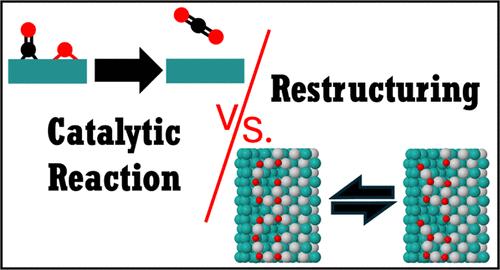ML-Accelerated Automatic Process Exploration Reveals Facile O-Induced Pd Step-Edge Restructuring on Catalytic Time Scales
IF 11.3
1区 化学
Q1 CHEMISTRY, PHYSICAL
引用次数: 0
Abstract
We combine automatic process exploration with an iteratively trained machine-learning interatomic potential to systematically identify elementary processes occurring during the initial oxidation of a Pd step edge. Corresponding process lists are a prerequisite to overcome prevalent predictive-quality microkinetic modeling approaches which consider only a minimum number of hand-selected and thus typically intuitive processes. The exploration readily generates close to 3000 inequivalent elementary processes and thus unveils a complexity far beyond current microkinetic modeling capabilities. Among these processes are numerous low-barrier processes involving the collective motion of several atoms that enable a facile O-mediated restructuring of the Pd step edge through the motion of larger PdxOy units. The concomitant interconversion happens on time scales comparable to those of molecular processes of heterogeneous oxidation catalysis. This suggests a dynamic aspect of the operando evolution of the working interface reminiscent of the fluxionality discussed in nanocluster catalysis.

求助全文
约1分钟内获得全文
求助全文
来源期刊

ACS Catalysis
CHEMISTRY, PHYSICAL-
CiteScore
20.80
自引率
6.20%
发文量
1253
审稿时长
1.5 months
期刊介绍:
ACS Catalysis is an esteemed journal that publishes original research in the fields of heterogeneous catalysis, molecular catalysis, and biocatalysis. It offers broad coverage across diverse areas such as life sciences, organometallics and synthesis, photochemistry and electrochemistry, drug discovery and synthesis, materials science, environmental protection, polymer discovery and synthesis, and energy and fuels.
The scope of the journal is to showcase innovative work in various aspects of catalysis. This includes new reactions and novel synthetic approaches utilizing known catalysts, the discovery or modification of new catalysts, elucidation of catalytic mechanisms through cutting-edge investigations, practical enhancements of existing processes, as well as conceptual advances in the field. Contributions to ACS Catalysis can encompass both experimental and theoretical research focused on catalytic molecules, macromolecules, and materials that exhibit catalytic turnover.
 求助内容:
求助内容: 应助结果提醒方式:
应助结果提醒方式:


